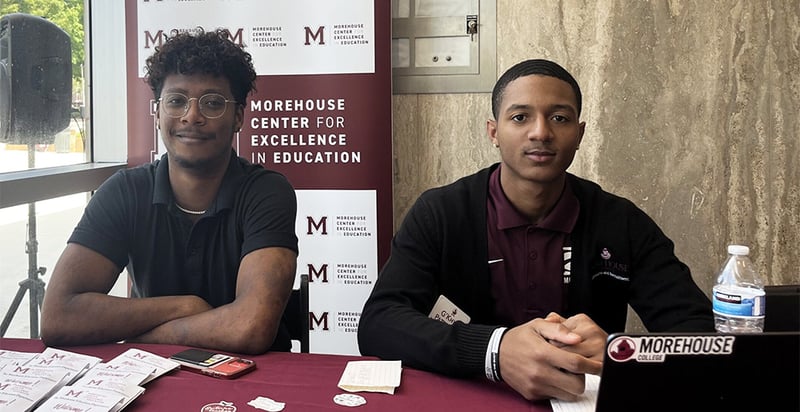- About
- Academics
- Admissions & Aid
- Life
- Research
- News & Events
Program at a glance
WELCOME TO THE MOREHOUSE COLLEGE EDUCATION DEPARTMENT
Department
The mission of the Morehouse Education Department is to prepare students for a wide range of careers and advanced study in education and related fields.
Learn More
Bachelor of Arts in Education Studies
The Bachelor of Arts Degree in Education Studies program is designed for students who want contribute to a more equitable and just society through the field of education.
Learn More
Bachelor of Arts in Early Childhood Education
Learn More
Students who compete the Bachelor of Arts in Early Childhood Education will be eligible for certification and prepared to teach in grades PreK-5.
Secondary Education Major
Learn More
Teacher Certification Programs Available at Morehouse College Students who desire to teach Biology or Computer Science[1] at the middle and/or high school levels (grades 6-12), may pursue a Major in Secondary Education by taking seven (8) Education courses in addition to the courses required by their major (double major).
About Education Studies
-
Overview
Who We Are, What We Do
The mission of the Morehouse Education Department is to prepare students for a wide range of careers and advanced study in education and related fields. As a historically all black university, our vision is to close the representation gap for Black men in classrooms, schools, districts, and educational leadership roles.
Morehouse College offers students a variety of options to gain a deep understanding of the theories, practices, and policies that will permit them to make meaningful impact in the education field.
The Education Department is led by accomplished faculty who are also experienced scholar-practitioners. Our faculty are well-equipped to support aspiring educators as they develop the competencies required to teach, lead or serve in culturally responsive learning environments.
Students who are Education majors and minors will participate in immersive field experiences that are integrated into their Morehouse academic program’s coursework. These field experiences encourage students to apply what they have learned in real-world contexts. Morehouse students who pursue the study of Education have several options:
- Bachelor of Arts in Education Studies: This degree program prepares students for a wide range of advanced study and/or careers in, or adjacent to the education sector, including but not limited to law, education technology, public policy, counseling and social services, and many others.
- Bachelor of Arts in Early Childhood Education (in partnership with Spelman College): Students interested in teaching at the elementary level (grades PK-5) are equipped with the specialized knowledge and instructional skills required to support the youngest learners. Early Childhood majors will simultaneously complete requirements for the major and certification to teach in Georgia.
- Bachelor of Arts in Secondary Education (Double Major): Students interested in obtaining Georgia certification to teach at the secondary level (grades 6-12) complete a Major in the content area in which they will teach while also completing a Major in Secondary Education. Students will hone their skills through coursework and field experiences required for a Georgia Educator’s License to teach grades 6-12 in their Major content area.
-
Outcomes
Student Learning Outcomes
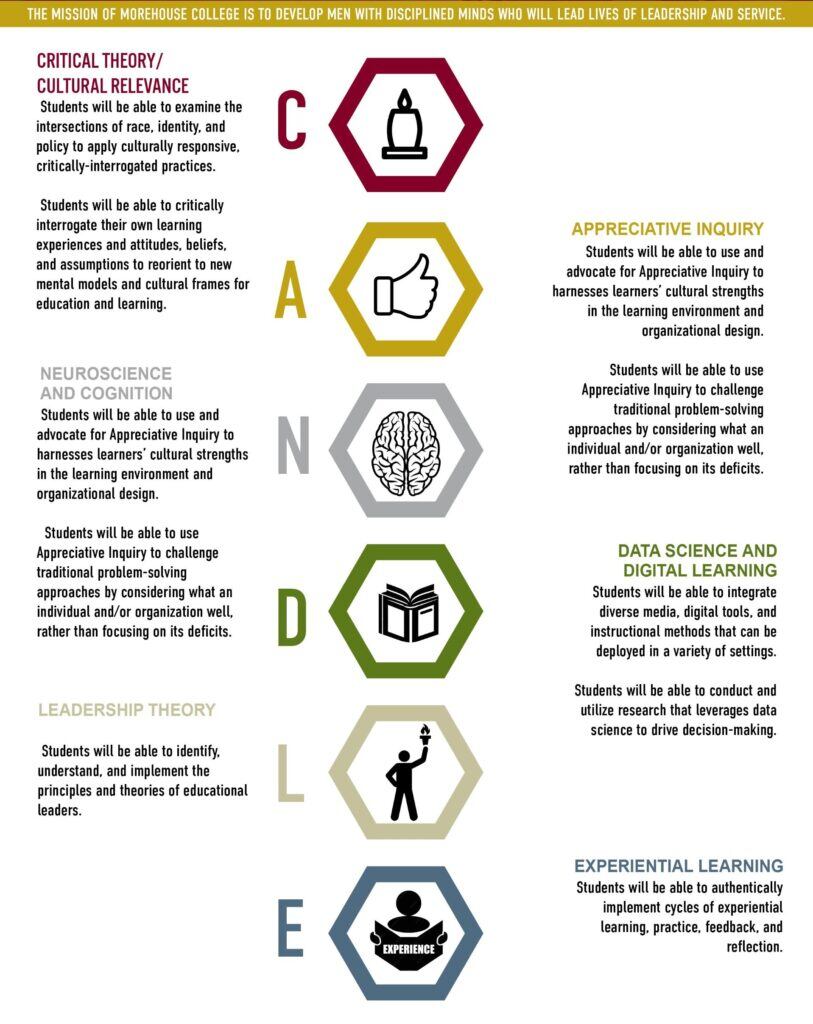
-
Education Studies Major/Minor
Education Studies Major/Minor
Education Studies majors will be introduced to the Education Ecosystem during the Orientation to Education course and the pre-advising process. Students will learn about the various career options and areas of advanced study in the education sector through programs, activities, courses, and internships that align with the ELITE Educator Pathways. Below are brief descriptions of each Pathway, and examples of careers and areas of further study for which the pathway prepares students:
EXPLORE (Education Policy, Advocacy, and Research) – Develops an understanding of the issues and policies that impact communities, students, and families from diverse backgrounds. Prepares majors for graduate study and a broad range of career opportunities in organizations and agencies that promote equity and social justice in education.LEAD (Leadership and Administration) – Promotes mastery and the development of leadership competencies students need to effectively serve in roles beyond the classroom. Prepares aspiring leaders for a variety of opportunities in education and other roles that support the business of teaching and learning.
INNOVATE (Social Entrepreneurship in Education) – Supports enterprising students who want to create innovative programs, instructional models, and inventions that break barriers and advance educational opportunities for all learners.
TEACH (Educator Preparation) – Provides a non-traditional pathway for students who desire to teach with the necessary courses, experiences and field placements that prepare them to effectively serve in various instructional settings and school models.
ENGAGE (Community and Family Engagement) Examines the influence of external organizations, agencies and social movements on a variety of stakeholders. Prepares students to make impact in roles that support the academic, socio-emotional, and spiritual well-being of students, their families and communities.
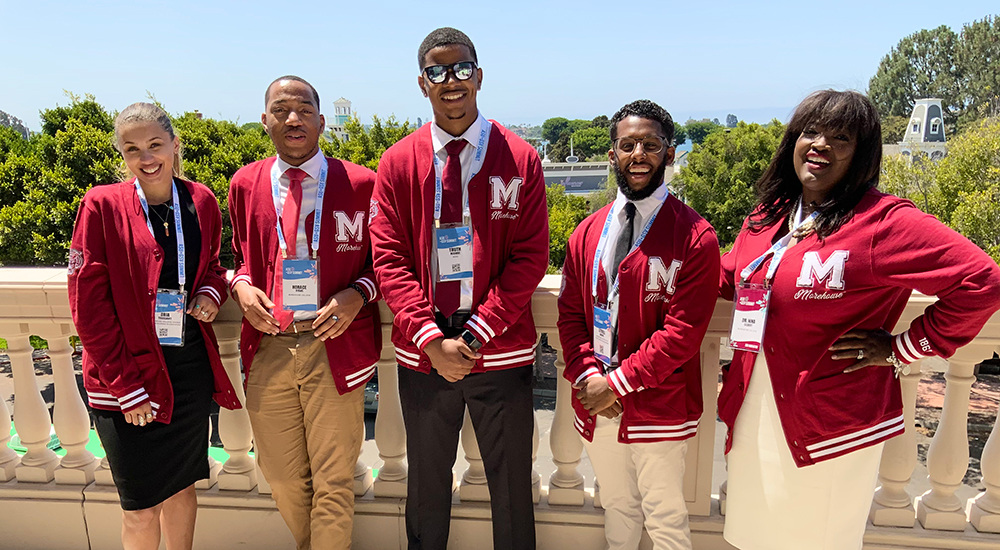
Morehouse future educators pose outside of the ASU/GSV conference in sunny San Diego. The conference is one of several annual travel and development opportunities for Morehouse Education Department students.
Education Studies Major (Non-Certification) (50 Hours)The Bachelor of Arts Degree in Education Studies program is designed for students who want contribute to a more equitable and just society through the field of education. The major provides a comprehensive, holistic and immersive course of study for students interested in understanding how education intersects with history, philosophy, culture politics and science. Our interdisciplinary approach equips students with a broad range of skills that are transferable to other fields where critical thinking, problem-solving, analysis and research skills are valued. Graduates will be well prepared to navigate the complexities of education in diverse settings, and pursue careers in teaching, administration, policy analysis, research, non-profit and other related professions.
The successful Education Studies major will complete 50 hours of coursework, which includes 38 credits of required coursework, 12 additional credits from a list of pre-approved Pathway Courses, a practicum and culminating internship that will provide opportunities for students to apply their knowledge in real-world contexts.
Required Courses in HEDU (38 hours)
- HEDU 305 Orientation to Education (3)
- HEDU 204 Educational Psychology (3)
- HEDU 300 Exceptional Learners (3)
- HEDU 435 Research in Child Development (3)
- HEDU 312 School Design and Leadership (3)
- HEDU 311 Developmental Literacy (3)
- HEDU 407 Advocacy in Urban Schools (3)
- HEDU 338 Junior Research Seminar (2)
- HEDU 399 Practicum (3)
- HEDU 442 Internship (9)
- HEDU 438 Senior Thesis (3)
Program Electives/Pathway Courses (12 Credit Hours)
In consultation with his assigned advisor, each student will select 12 credits from an approved list of Pathway Courses. This customization allows students to make interdisciplinary connections, and helps develop the knowledge, skills and understanding necessary for the successful completion of the required internship and practicum.
Total Required Credit Hours for Education Studies Major: 50
Education Studies Minor (18 Credit Hours)The Education Studies Minor allows students to study a wide variety of important educational issues and is open to all majors. Students pursing the Education Studies Minor must complete four required Education Studies courses and two elective courses.
Program Requirements
- A grade of C or higher in required Education Studies courses
- Pre-approval of Elective Courses
Required Courses for Education Studies Minor (12 credits)
HEDU 305 Orientation to Education (3)
HEDU 204 Educational Psychology (3)
HEDU 407 Advocacy in Urban Schools (3)
HEDU 435 Research in Child Development (3)Elective Courses Options for Education Studies Minor (6 credits)
HEDU 312 School Design and Leadership (3)
HEDU 300 Exceptional Learners (3)
HEDU 311 Developmental Literacy (3)
EDU 499 Special Topics in Education (3)
PSY 265 Developmental Psychology (3)
PSY 270 Community Psychology (3)
Total Required Credit Hours for Education Studies Minor: 18
-
Early Childhood Education Major
Early Childhood Education Major
Early Childhood Education Major (P-5 Teacher Certification) Students who compete the Bachelor of Arts in Early Childhood Education will be eligible for certification and prepared to teach in grades PreK-5. Students who express interest in the Early Childhood major will be advised and supported by a Faculty member from the Morehouse Education Department, however, students must take all required courses for the major at Spelman College. For more information, visit the Spelman College website for a complete description of this program and its requirements.
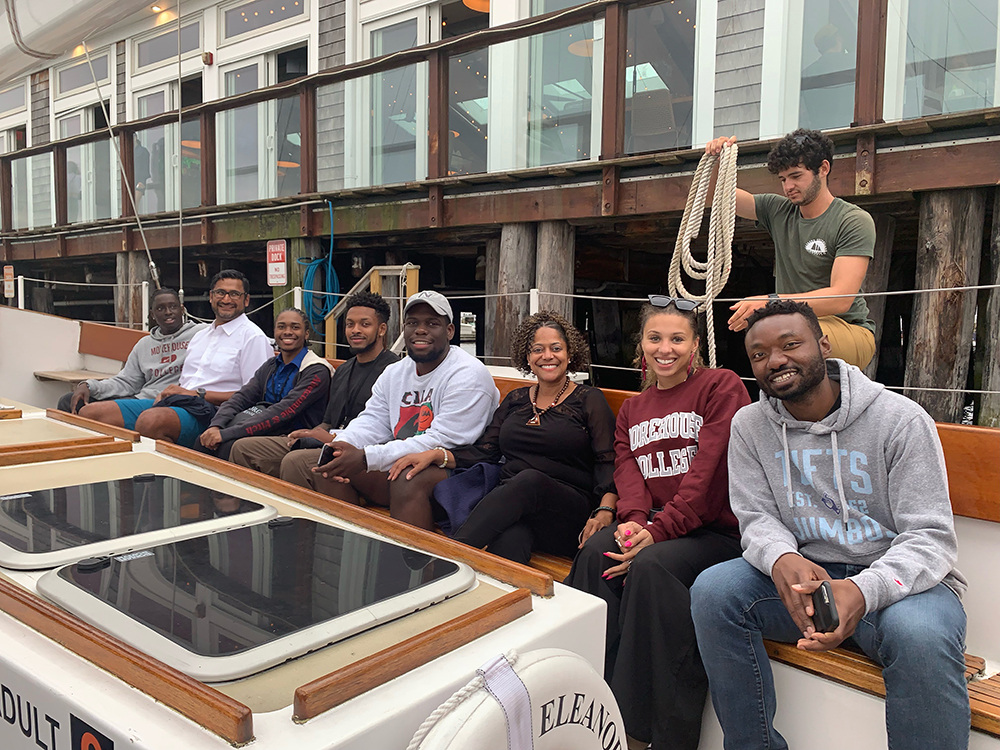 Morehouse Education Department juniors, seniors, and recent graduates join other HBCU Education Majors on the Building Bridges tour, an opportunity for future educators from HBCUs to learn more about teaching in New England boarding schools. Program attendees enjoy a boat ride through the Rhode Island harbor.
Morehouse Education Department juniors, seniors, and recent graduates join other HBCU Education Majors on the Building Bridges tour, an opportunity for future educators from HBCUs to learn more about teaching in New England boarding schools. Program attendees enjoy a boat ride through the Rhode Island harbor. -
Secondary Education Major
Secondary Education Major
Secondary Education Major (6-12 Teacher Certification in Biology and Computer Science)
Teacher Certification Programs Available at Morehouse College Students who desire to teach Biology or Computer Science[1] at the middle and/or high school levels (grades 6-12), may pursue a Major in Secondary Education by taking seven (8) Education courses in addition to the courses required by their major (double major).
Additionally, interested students must meet admissions requirements and follow the course plan that leads to certification in their content area.
Teacher Certification Programs Available to Morehouse Students in Partnership with Spelman College
Other majors that lead to the Secondary Education certification are offered at Spelman College and include English, Chemistry, Mathematics, History, Physics and Political Science. Students who are interested in pursing Secondary Education certification in these areas must meet the requirements for their major and all requirements outlined on the Spelman College Education Department Website.
Program Requirements
Students must declare the Secondary Education Major by fall of their sophomore year, and complete the Orientation to Education at Morehouse College (for Biology and Computer Science Majors) and Spelman College for other all other certification areas. A GPA of 2.7 or greater is required for acceptance into the Secondary Education Major programs. Additional requirements include:
- Successfully passing the Georgia Professional Practices Commission’s Code of Ethics for Professional Educators
- A grade of B or higher in all Secondary Education courses and field experiences
- Liability tort insurance and a clear background check prior to beginning field experience or student teaching
Secondary Education Certification Major Course of Study for Biology and Computer Science Majors[4]
1. HEDU 305 Orientation to Education (3)
2. HEDU 204 Educational Psychology (3)
3. HEDU 300 Exceptional Learners (3)
4. HEDU 311 Developmental Literacy (3)
5. HEDU 444 Curr & Methods/Teaching in Sec. Schools (3)
6. HEDU 451 Seminar I for Student Teaching (3)
7. HEDU 452 Seminar II for Student Teaching (2)
8. HEDU 458 Student Teaching (12)Total Required Credit Hours for Secondary Education Major: 32
-
FAQs

FAQs
Q. Which careers will a degree in Education Studies or a minor in Secondary Education prepare me for?
A. Secondary Education Minors take the required Education coursework for Georgia state secondary teacher certification as their Minor while completing the course of study for class they will teach (Biology, Computer Science, etc.) as their Major. In addition, the Secondary Education Minor provides support to complete all requirements outside of coursework for certification (exams, backgrounds checks, etc.). Upon successful completion of the Minor and associated requirements, graduates will be fully licensed to teach in grades 6-12 in Georgia (licensed Georgia educators are also eligible for reciprocity in many other states).Students who earn a Bachelor of Arts in Education Studies are prepared for any careers that leverage expertise in the science of learning, the history and philosophy of education, and psychology of education. Students design the interdisciplinary pathway of courses around their specific career or interest. In addition to traditional teaching roles, Education Studies graduates have gone on to careers in law, public policy, training and development, technology, counseling and social services, philanthropy and communications.
Q. What will I learn in Education Department coursework?
A. Education Department coursework includes the history of education, various philosophies of education, theories of how people are educated, topics in education policy and law, neuroscience, data science, and the education of specific populations and groups of people.
The entire department is anchored by a theoretical framework, which is captured in the acronym CANDLE: Critical Theory and Culturally Responsive Practice, Appreciative Inquiry, Neuroscience and Cognition, Data Science and Digital Technologies, Leadership Theory, and Experiential Learning. Learn more about the CANDLE framework here.
Q. Will I get experience in real classrooms?
A. Experiential learning is a cornerstone of the Education Department. Most experiences include learning opportunities in education-centered environments off-campus. Education Studies Majors complete a practicum and internship, and Secondary Education Minors complete student teaching.
All field experience reflections and assignments are captured in a dynamic, virtual portfolio platform which stores all key assessments and assignments in one place. Students can keep and share their portfolio with prospective employers throughout their tenure with the Department and after graduation.
Q. How do I find out which program is right for me? Should I be registered at Spelman or Morehouse?
A. Before a student declares Education as their major or enrolls in education classes at Spelman, they should first contact the Morehouse Education Department to meet with an advisor. The Elementary Education Major and some Secondary Education Minors (seeking Georgia certification) are offered through Spelman.
Students will complete their entire education sequence at the campus that offers their specific program, so it is important to enroll in classes with the support of an advisor from the Morehouse Education Department who can provide a thorough review of all options. Contact MCEE@morehouse.edu or stop by Wheeler Hall Room 114 to schedule an advising appointment.
-
Contact Us
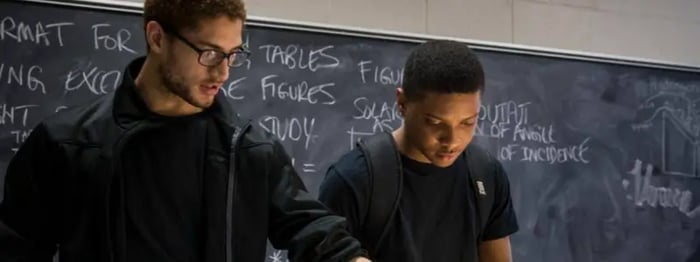
Contact Us
Students who have declared majors/minors in Education Studies, Elementary Education, or Secondary Education or who are interested in learning more about what is offered in the Morehouse College Education Department, should schedule an appointment with an Education Department advisor at bria.touissant@morehouse.edu.
Students who take classes through Spelman’s teacher certification program will still need to meet with a Morehouse Education Department Advisor. Email MCEE@morehouse.edu for more information.Instagram: @morehouseeliteeducators
Morehouse alumni educators, join our community here.
Education Department
Wheeler Hall 114
830 Westview Dr.
Atlanta, GA 30314Email: mcee@morehouse.edu
Main: 404-301-6407
Who We Are, What We Do
The mission of the Morehouse Education Department is to prepare students for a wide range of careers and advanced study in education and related fields. As a historically all black university, our vision is to close the representation gap for Black men in classrooms, schools, districts, and educational leadership roles.
Morehouse College offers students a variety of options to gain a deep understanding of the theories, practices, and policies that will permit them to make meaningful impact in the education field.
The Education Department is led by accomplished faculty who are also experienced scholar-practitioners. Our faculty are well-equipped to support aspiring educators as they develop the competencies required to teach, lead or serve in culturally responsive learning environments.
Students who are Education majors and minors will participate in immersive field experiences that are integrated into their Morehouse academic program’s coursework. These field experiences encourage students to apply what they have learned in real-world contexts. Morehouse students who pursue the study of Education have several options:
- Bachelor of Arts in Education Studies: This degree program prepares students for a wide range of advanced study and/or careers in, or adjacent to the education sector, including but not limited to law, education technology, public policy, counseling and social services, and many others.
- Bachelor of Arts in Early Childhood Education (in partnership with Spelman College): Students interested in teaching at the elementary level (grades PK-5) are equipped with the specialized knowledge and instructional skills required to support the youngest learners. Early Childhood majors will simultaneously complete requirements for the major and certification to teach in Georgia.
- Bachelor of Arts in Secondary Education (Double Major): Students interested in obtaining Georgia certification to teach at the secondary level (grades 6-12) complete a Major in the content area in which they will teach while also completing a Major in Secondary Education. Students will hone their skills through coursework and field experiences required for a Georgia Educator’s License to teach grades 6-12 in their Major content area.
Student Learning Outcomes

Education Studies Major/Minor
Education Studies majors will be introduced to the Education Ecosystem during the Orientation to Education course and the pre-advising process. Students will learn about the various career options and areas of advanced study in the education sector through programs, activities, courses, and internships that align with the ELITE Educator Pathways. Below are brief descriptions of each Pathway, and examples of careers and areas of further study for which the pathway prepares students:
EXPLORE (Education Policy, Advocacy, and Research) – Develops an understanding of the issues and policies that impact communities, students, and families from diverse backgrounds. Prepares majors for graduate study and a broad range of career opportunities in organizations and agencies that promote equity and social justice in education.
LEAD (Leadership and Administration) – Promotes mastery and the development of leadership competencies students need to effectively serve in roles beyond the classroom. Prepares aspiring leaders for a variety of opportunities in education and other roles that support the business of teaching and learning.
INNOVATE (Social Entrepreneurship in Education) – Supports enterprising students who want to create innovative programs, instructional models, and inventions that break barriers and advance educational opportunities for all learners.
TEACH (Educator Preparation) – Provides a non-traditional pathway for students who desire to teach with the necessary courses, experiences and field placements that prepare them to effectively serve in various instructional settings and school models.
ENGAGE (Community and Family Engagement) Examines the influence of external organizations, agencies and social movements on a variety of stakeholders. Prepares students to make impact in roles that support the academic, socio-emotional, and spiritual well-being of students, their families and communities.

Education Studies Major (Non-Certification) (50 Hours)
The Bachelor of Arts Degree in Education Studies program is designed for students who want contribute to a more equitable and just society through the field of education. The major provides a comprehensive, holistic and immersive course of study for students interested in understanding how education intersects with history, philosophy, culture politics and science. Our interdisciplinary approach equips students with a broad range of skills that are transferable to other fields where critical thinking, problem-solving, analysis and research skills are valued. Graduates will be well prepared to navigate the complexities of education in diverse settings, and pursue careers in teaching, administration, policy analysis, research, non-profit and other related professions.
The successful Education Studies major will complete 50 hours of coursework, which includes 38 credits of required coursework, 12 additional credits from a list of pre-approved Pathway Courses, a practicum and culminating internship that will provide opportunities for students to apply their knowledge in real-world contexts.
Required Courses in HEDU (38 hours)
- HEDU 305 Orientation to Education (3)
- HEDU 204 Educational Psychology (3)
- HEDU 300 Exceptional Learners (3)
- HEDU 435 Research in Child Development (3)
- HEDU 312 School Design and Leadership (3)
- HEDU 311 Developmental Literacy (3)
- HEDU 407 Advocacy in Urban Schools (3)
- HEDU 338 Junior Research Seminar (2)
- HEDU 399 Practicum (3)
- HEDU 442 Internship (9)
- HEDU 438 Senior Thesis (3)
Program Electives/Pathway Courses (12 Credit Hours)
In consultation with his assigned advisor, each student will select 12 credits from an approved list of Pathway Courses. This customization allows students to make interdisciplinary connections, and helps develop the knowledge, skills and understanding necessary for the successful completion of the required internship and practicum.
Total Required Credit Hours for Education Studies Major: 50
Education Studies Minor (18 Credit Hours)
The Education Studies Minor allows students to study a wide variety of important educational issues and is open to all majors. Students pursing the Education Studies Minor must complete four required Education Studies courses and two elective courses.
Program Requirements
- A grade of C or higher in required Education Studies courses
- Pre-approval of Elective Courses
Required Courses for Education Studies Minor (12 credits)
HEDU 305 Orientation to Education (3)
HEDU 204 Educational Psychology (3)
HEDU 407 Advocacy in Urban Schools (3)
HEDU 435 Research in Child Development (3)
Elective Courses Options for Education Studies Minor (6 credits)
HEDU 312 School Design and Leadership (3)
HEDU 300 Exceptional Learners (3)
HEDU 311 Developmental Literacy (3)
EDU 499 Special Topics in Education (3)
PSY 265 Developmental Psychology (3)
PSY 270 Community Psychology (3)
Total Required Credit Hours for Education Studies Minor: 18
Early Childhood Education Major
Early Childhood Education Major (P-5 Teacher Certification) Students who compete the Bachelor of Arts in Early Childhood Education will be eligible for certification and prepared to teach in grades PreK-5. Students who express interest in the Early Childhood major will be advised and supported by a Faculty member from the Morehouse Education Department, however, students must take all required courses for the major at Spelman College. For more information, visit the Spelman College website for a complete description of this program and its requirements.

Morehouse Education Department juniors, seniors, and recent graduates join other HBCU Education Majors on the Building Bridges tour, an opportunity for future educators from HBCUs to learn more about teaching in New England boarding schools. Program attendees enjoy a boat ride through the Rhode Island harbor.
Secondary Education Major
Secondary Education Major (6-12 Teacher Certification in Biology and Computer Science)
Teacher Certification Programs Available at Morehouse College Students who desire to teach Biology or Computer Science[1] at the middle and/or high school levels (grades 6-12), may pursue a Major in Secondary Education by taking seven (8) Education courses in addition to the courses required by their major (double major).
Additionally, interested students must meet admissions requirements and follow the course plan that leads to certification in their content area.
Teacher Certification Programs Available to Morehouse Students in Partnership with Spelman College
Other majors that lead to the Secondary Education certification are offered at Spelman College and include English, Chemistry, Mathematics, History, Physics and Political Science. Students who are interested in pursing Secondary Education certification in these areas must meet the requirements for their major and all requirements outlined on the Spelman College Education Department Website.
Program Requirements
Students must declare the Secondary Education Major by fall of their sophomore year, and complete the Orientation to Education at Morehouse College (for Biology and Computer Science Majors) and Spelman College for other all other certification areas. A GPA of 2.7 or greater is required for acceptance into the Secondary Education Major programs. Additional requirements include:
- Successfully passing the Georgia Professional Practices Commission’s Code of Ethics for Professional Educators
- A grade of B or higher in all Secondary Education courses and field experiences
- Liability tort insurance and a clear background check prior to beginning field experience or student teaching
Secondary Education Certification Major Course of Study for Biology and Computer Science Majors[4]
1. HEDU 305 Orientation to Education (3)
2. HEDU 204 Educational Psychology (3)
3. HEDU 300 Exceptional Learners (3)
4. HEDU 311 Developmental Literacy (3)
5. HEDU 444 Curr & Methods/Teaching in Sec. Schools (3)
6. HEDU 451 Seminar I for Student Teaching (3)
7. HEDU 452 Seminar II for Student Teaching (2)
8. HEDU 458 Student Teaching (12)
Total Required Credit Hours for Secondary Education Major: 32

FAQs
Q. Which careers will a degree in Education Studies or a minor in Secondary Education prepare me for?
A. Secondary Education Minors take the required Education coursework for Georgia state secondary teacher certification as their Minor while completing the course of study for class they will teach (Biology, Computer Science, etc.) as their Major. In addition, the Secondary Education Minor provides support to complete all requirements outside of coursework for certification (exams, backgrounds checks, etc.). Upon successful completion of the Minor and associated requirements, graduates will be fully licensed to teach in grades 6-12 in Georgia (licensed Georgia educators are also eligible for reciprocity in many other states).
Students who earn a Bachelor of Arts in Education Studies are prepared for any careers that leverage expertise in the science of learning, the history and philosophy of education, and psychology of education. Students design the interdisciplinary pathway of courses around their specific career or interest. In addition to traditional teaching roles, Education Studies graduates have gone on to careers in law, public policy, training and development, technology, counseling and social services, philanthropy and communications.
Q. What will I learn in Education Department coursework?
A. Education Department coursework includes the history of education, various philosophies of education, theories of how people are educated, topics in education policy and law, neuroscience, data science, and the education of specific populations and groups of people.
The entire department is anchored by a theoretical framework, which is captured in the acronym CANDLE: Critical Theory and Culturally Responsive Practice, Appreciative Inquiry, Neuroscience and Cognition, Data Science and Digital Technologies, Leadership Theory, and Experiential Learning. Learn more about the CANDLE framework here.
Q. Will I get experience in real classrooms?
A. Experiential learning is a cornerstone of the Education Department. Most experiences include learning opportunities in education-centered environments off-campus. Education Studies Majors complete a practicum and internship, and Secondary Education Minors complete student teaching.
All field experience reflections and assignments are captured in a dynamic, virtual portfolio platform which stores all key assessments and assignments in one place. Students can keep and share their portfolio with prospective employers throughout their tenure with the Department and after graduation.
Q. How do I find out which program is right for me? Should I be registered at Spelman or Morehouse?
A. Before a student declares Education as their major or enrolls in education classes at Spelman, they should first contact the Morehouse Education Department to meet with an advisor. The Elementary Education Major and some Secondary Education Minors (seeking Georgia certification) are offered through Spelman.
Students will complete their entire education sequence at the campus that offers their specific program, so it is important to enroll in classes with the support of an advisor from the Morehouse Education Department who can provide a thorough review of all options. Contact MCEE@morehouse.edu or stop by Wheeler Hall Room 114 to schedule an advising appointment.

Contact Us
Students who have declared majors/minors in Education Studies, Elementary Education, or Secondary Education or who are interested in learning more about what is offered in the Morehouse College Education Department, should schedule an appointment with an Education Department advisor at bria.touissant@morehouse.edu.
Students who take classes through Spelman’s teacher certification program will still need to meet with a Morehouse Education Department Advisor. Email MCEE@morehouse.edu for more information.
Instagram: @morehouseeliteeducators
Morehouse alumni educators, join our community here.
Education Department
Wheeler Hall 114
830 Westview Dr.
Atlanta, GA 30314
Email: mcee@morehouse.edu
Main: 404-301-6407
Meet Our Faculty and Staff
Dr. Nina Gilbert, Department Chair
Jennifer Jones, Department Coordinator
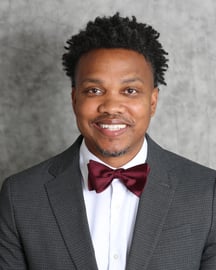
H. Justin Ballenger
Assistant Professor
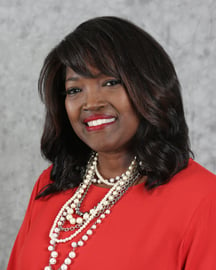
Nina Gilbert
Assistant Professor/Dept Chair
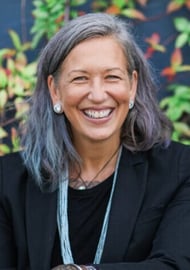
Kristin Moody
Director of Academic Programs and Strategic Initiatives/ Adjunct Professor, English
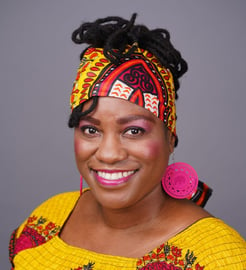
Muhsinah Lateefah Morris
Senior Assistant Professor NTT
